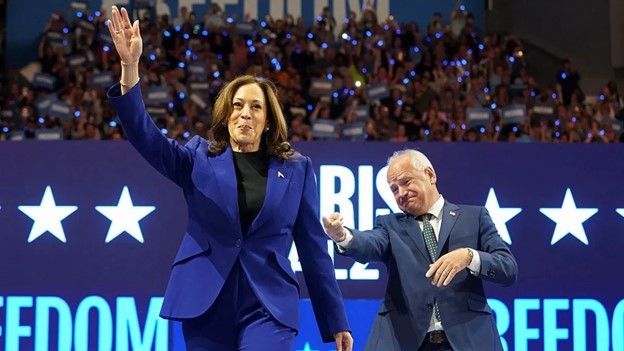
On August 22, the Democratic National Convention held in Chicago almost unanimously nominated Kamala Harris as a US presidential candidate.
Although she stated in her speech that she intends to be president for all Americans, Harris nevertheless emphasised that if D. Trump is elected to the White House, the country will face huge troubles – if not a catastrophe.
The country is being torn apart by ethnic and racial problems, it is no longer an island of stability and tranquillity. Over the past four years, the Biden-Harris administration has carried out few reforms to increase confidence in the country’s elections. In addition to concerns about democracy, most Americans are concerned about problems in the economy: inflation is now 18% higher than when this government came to power and weekly household spending has increased much more than that. This has led to the fact that many Americans – almost 40 million of whom live below the poverty line – have lost faith in the Biden-Harris regime, despite its attempts to blame Trump for the economic mess.
Blatant inequality and corruption were seen in the organisation of the Democratic National Convention (DNC), where sponsors paid several million dollars for a place amidst the luxury at the venue and the total budget of the event, which was estimated at almost $100 million, was funded by ‘super-rich and influential groups with big money’.
Kamala Harris was not chosen, she was simply appointed as the candidate
Although Harris (59) is 2 decades older than the average age of the US population, her supporters tried to present her nomination as passing the bar to a new generation. However, it is not clear whether this will radically change the gerontocratic policy of the country, where it is difficult for young people to break through, since their elders cling to office until old age. The average age in the US Senate is over 65 years old, so some young members of the Democratic Party (aged 18-29) do not vote in elections. Only half of Americans within this age group voted in the 2020 elections.
As Al Jazeera’s website noted on August 23, Harris put forward few concrete proposals to consolidate democracy, heal ethnic and racial divisions in the country, address poverty, police brutality and glaring inequality and bring the country in line with international law. Instead, her speech was dominated by vague promises and dire warnings about what would happen if Trump was re-elected.
It is noteworthy that even the Democrat-loyal press wrote that Biden was suspended from the elections as a result of behind–the-scenes intrigues of Democratic Party elites, which almost resembled a coup. Some newspapers claimed that Biden was given an ultimatum that if he did not agree to withdraw from the presidential race, he would simply be fired because of his ill health – the whole country saw that he is a decrepit leader.
Immediately following the end of the DNC, the Democrats took another blow. Robert Kennedy (nephew of President John F. Kennedy, who was assassinated in 1963), who led his presidential campaign as an independent candidate, announced that he was withdrawing from the race and would support Donald Trump in the elections (the Kennedy clan is known as one of the pillars of the Democratic Party).
A number of US newspapers began cautiously throwing critique at Kamala Harris, accusing her of not holding a press conference throughout the ca. month of her election campaign (contrary to US traditions). In addition, doubts began to arise about some of her declared domestic political initiatives.
The Economist: The Democratic presidential candidate lacks “though-out principles”
Perhaps these sentiments were best expressed by the Economist magazine on August 22, which bluntly stated that the presidential candidate from the Democratic Party did not have “thought-out principles”. Price manipulations (she promised to regulate food prices) are simply not supported by evidence, but nevertheless undermine faith in open markets. She promised $25,000 grants to help first-time home buyers, however, if she also fails in her plan to increase housing, subsidies will instead raise house prices.
Given that the US’ budget deficit is 7% of GDP, her proposals to increase child tax benefits may turn out to be reckless and inflationary.
In general, many observers come to the conclusion that in the time remaining until November 5, i.e. before the elections, the internal political struggle in the United States will escalate and we will witness unusual turns in the presidential race more than once.
Vladimir MASHIN, PhD in History, political observer, exclusively for «New Eastern Outlook»
